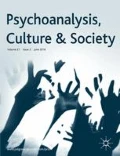Abstract
Stand-up comedy binds dramatic cultural spectacle to ritualised, intimate exposure. Examining ‘case’ examples from live comic performance, this paper describes stand-up as a kind of social dreaming. The article proposes a theoretical frame drawing on Thomas Ogden's notion of ‘talking as dreaming’ and psychoanalytic accounts connecting humour and melancholia. Locating the stand-up comedian's propensity for humour in a specialist capacity to hone, display and process traumata, the paper characterises stand-up as a performative oscillation evoking paranoid-schizoid and depressive anxieties. A psychosocial gloss places stand-up as a cultural resource in the service of the popular-as-therapeutic. The paper articulates complementarities between Henri Bergson's formulations on the function of laughter and an emergent object relations account in order to help to recognise ‘containing’ and ‘cultural-restorative’ aspects of much stand-up, understood as contemporary psychosocial ritual.
Similar content being viewed by others
Notes
This event was organized as part of the AHRC funded Media and the Inner World seminar series by Directors Candida Yates and Caroline Bainbridge. The event took place in a London comedy venue and included participation by performers, analysts, a specialist panel and an audience engaged in enjoying comedy – and thinking about it. The comedic sets were filmed and audio-recorded with the full permission of the participants and have furnished material for detailed analysis. The author was present at the event as both participant and observer.
These characters are selected at random and have no coherent meaning. They stand here – in ideographic form – to relay the approximate impact of the staged incomprehensible joke – with ‘words’ as ‘things’.
References
Barthes, R. (1983) Barthes: Selected Writings. London: Fontana.
Bergson, H. (1911) Laughter: An Essay on the Meaning of the Comic. London: Macmillan.
Bollas, C. (1993) On Being a Character. London: Routledge.
Bollas, C. (1995) Cracking Up: The Work of Unconscious Experience. London: Routledge.
Carr, J. and Greeves, L. (2007) The Naked Jape: Uncovering the Hidden World of Jokes. London: Penguin Books.
Chasseguet-Smirgel, J. (1988) The triumph of humor. In: H.P. Blum, Y. Kramer, A.K. Richards and A.D. Richards (eds.) Fantasy, Myth and Reality: Essays in Honor of Jacob A. Arlow, M.D. Madison, CT: International Universities Press, pp. 197–213.
Chortle. (2010) The state of the industry. Conference review. 13 September 2010 http://www.chortle.co.uk/news/2010/09/13/11707/the_state_of_the_industry, accessed 30 October 2011.
Cook, W. (2001) The Comedy Store: The Club That Changed British Comedy. London: Little, Brown.
Double, O. (1997) Stand Up! On Being a Comedian. London: Methuen.
Double, O. (2005) Getting the Joke: The Art of Stand-Up Comedy. London: Methuen.
Durant, J. and Miller, J. (1988) Laughing Matters: A Serious Look at Humour. London: Longman.
Freud, S. (1905, 1960) Jokes and their relation to the unconscious. Standard Edition, 8. London: Hogarth Press, pp. 9–236.
Freud, S. (1927, 1961) Humour. Standard Edition, 21. London: Hogarth Press, pp. 159–166.
Frye, N. (1957) Anatomy of Criticism. Princeton, NJ: Princeton University Press.
Limon, J. (2000) Stand-Up Comedy in Theory: Or, Abjection in America. Durham, NC: Duke University Press.
Mauss, M. (1954) The Gift: Forms and Functions of Exchange in Archaic Societies. London: Routledge.
Medhurst, A. (2007) A National Joke: Popular Comedy and English Cultural Identities. London: Routledge.
Mintz, L.E. (1985) Stand-up comedy as social and cultural mediation. American Quarterly 37 (1): 71–80.
Nikkhah, R . (2008) Heard the one about the recession? Sales of comedy DVDs soar as economy sinks. DailyTelegraph, 6 December, http://www.telegraph.co.uk/news/uknews/3569712/Heard-the-one-about-the-recession-Sales-of-comedy-DVDs-soar-as-economy-sinks.html, accessed October 2011.
Ogden, T.H. (1992) The Matrix of the Mind: Object Relations and the Psychoanalytic Dialogue. London: Karnac Books.
Ogden, T.H. (2009) Rediscovering Psychoanalysis: Thinking and Dreaming, Learning and Forgetting. London: Routledge.
Poland, W.S. (1990) The gift of laughter: On the development of a sense of humor in clinical analysis. Psychoanalytic Quarterly 59 (2): 197–225.
Wilkie, I. and Saxton, M. (2010) The origins of comic performance in adult–child interaction. Comedy Studies 1 (1): 21–32.
Winnicott, D.W. (1973) Playing and Reality. London: Routledge.
Wolf, M. (2003) The Entertainment Economy: How Mega-Media Forces Are Transforming Our Lives. New York: Three Rivers Press.
Author information
Authors and Affiliations
Rights and permissions
About this article
Cite this article
MacRury, I. Humour as ‘social dreaming’: Stand-up comedy as therapeutic performance. Psychoanal Cult Soc 17, 185–203 (2012). https://doi.org/10.1057/pcs.2012.20
Published:
Issue Date:
DOI: https://doi.org/10.1057/pcs.2012.20




